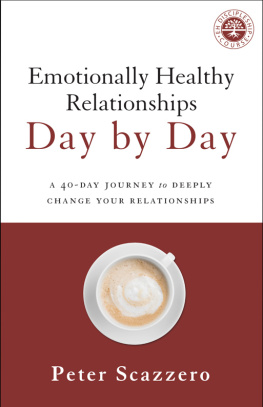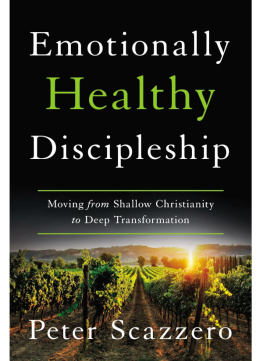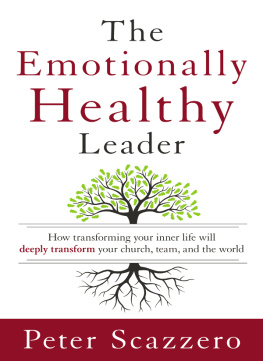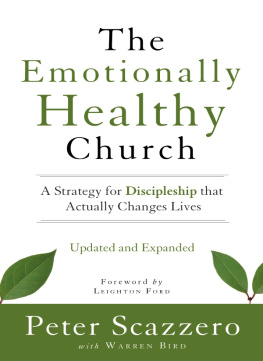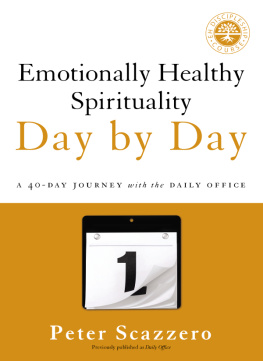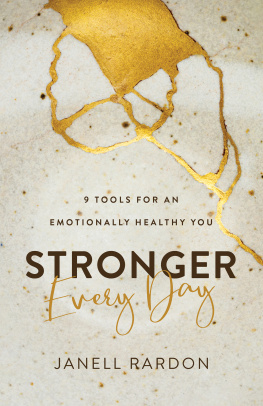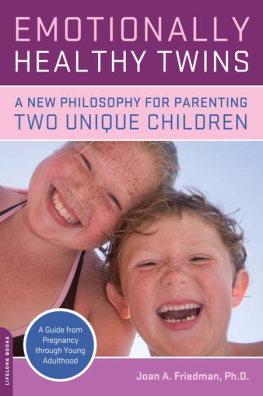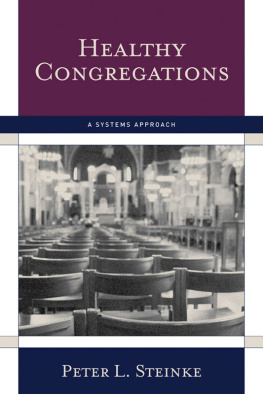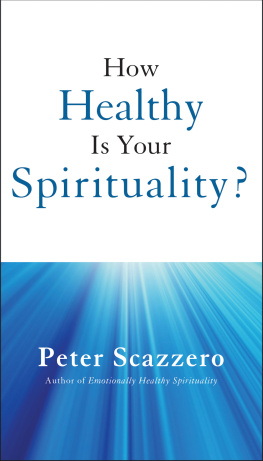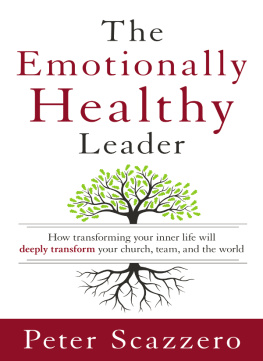Peter Scazzero - Emotionally Healthy Relationships Day by Day
Here you can read online Peter Scazzero - Emotionally Healthy Relationships Day by Day full text of the book (entire story) in english for free. Download pdf and epub, get meaning, cover and reviews about this ebook. year: 2017, publisher: Zondervan, genre: Religion. Description of the work, (preface) as well as reviews are available. Best literature library LitArk.com created for fans of good reading and offers a wide selection of genres:
Romance novel
Science fiction
Adventure
Detective
Science
History
Home and family
Prose
Art
Politics
Computer
Non-fiction
Religion
Business
Children
Humor
Choose a favorite category and find really read worthwhile books. Enjoy immersion in the world of imagination, feel the emotions of the characters or learn something new for yourself, make an fascinating discovery.
- Book:Emotionally Healthy Relationships Day by Day
- Author:
- Publisher:Zondervan
- Genre:
- Year:2017
- Rating:3 / 5
- Favourites:Add to favourites
- Your mark:
- 60
- 1
- 2
- 3
- 4
- 5
Emotionally Healthy Relationships Day by Day: summary, description and annotation
We offer to read an annotation, description, summary or preface (depends on what the author of the book "Emotionally Healthy Relationships Day by Day" wrote himself). If you haven't found the necessary information about the book — write in the comments, we will try to find it.
Emotionally Healthy Relationships Day by Day — read online for free the complete book (whole text) full work
Below is the text of the book, divided by pages. System saving the place of the last page read, allows you to conveniently read the book "Emotionally Healthy Relationships Day by Day" online for free, without having to search again every time where you left off. Put a bookmark, and you can go to the page where you finished reading at any time.
Font size:
Interval:
Bookmark:
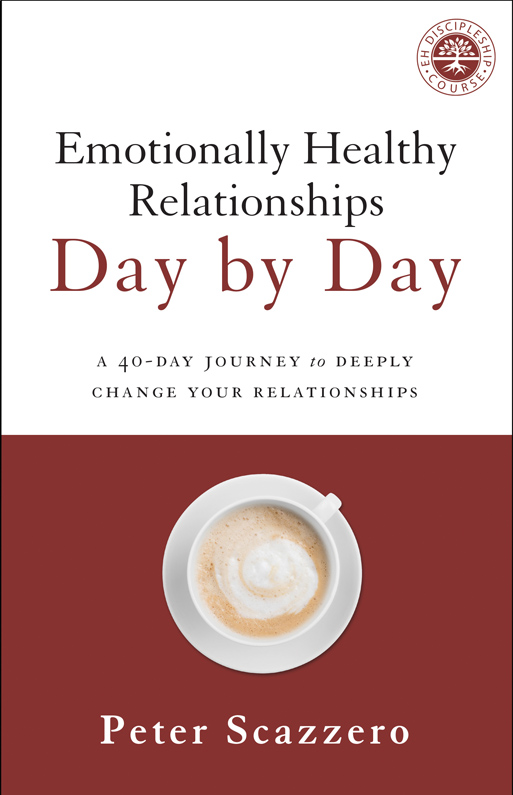
To June Eileen Sundquist
I want to begin by acknowledging the pioneering work of Benedict of Nursia, the sixth-century Italian monk, for making widely available to the Western Church the practice of the Daily Office. And I am grateful to the Trappist monks of St. Josephs Abbey in Spencer, Massachusetts, who first offered me a lived experience of the beauty and power of stopping to be with God multiple times a day during a 2003 weeklong retreat.
I also want to acknowledge Christine Anderson for the rich combination of editorial gifts she brought to this project. Her eye for consistency and fractures in my logic made it a much better, and richer, devotional. Thank you, Christine, for consistently pushing me to be a better writer. Thanks also to Greg Clouse at Zondervan for carrying this EH Relationships Day by Day to completion, bringing a patient, careful, editorial eye to detail.
The Emotionally Healthy Spirituality team at Zondervan have been wonderful partners over the years. A special thanks to Sandy Vander Zicht, John Raymond, Tom Dean, Ryan Pazdur, Beth Murphy, and David Morris. Your love for Christ and publishing expertise is a gift to the work of God around the world.
And finally, a thank you to Geri, my lovely wife and best friend. Thank you, Geri, for being the most godly, amazing woman I know.
A number of years ago, a friend who had quit attending church asked me privately, Why is it that so many Christians make such lousy human beings? In other words, why are so many of us judgmental, defensive, and touchy?
I believe part of the reason stems from the fact that we so readily compartmentalize loving God from loving others. This was something the religious leaders in Jesus day did as well. They were diligent and zealous to love God, but they were not equally diligent and zealous to love people. This put them on a collision course with Jesus. Toward the end of his ministry, Jesus summarized the entire Bible for them with these words: Love the Lord your God with all your heart.... This is the first and greatest commandment. And the second is like it: Love your neighbor as yourself. All the Law and Prophets hang on these two commandments (Matthew 22:3740). When we experience a breakdown in our relationship with God, a breakdown in our relationship with people follows. The connection between the two is unbreakable.
Jesus also linked our ability to love people with our ability to bear witness to him in the world: Everyone will know you are my disciples, if you love one another (John 13:35). In other words, when we dont love well, the implications go beyond our personal lives, our families, our neighborhoods, and our churches. When we dont love others well, the beauty and love of Jesus is tarnished and sullied to the world.
So it is critically important that we grow as Christ followers in our ability to love people. That is the purpose behind The Emotionally Healthy (EH) Relationships Course, which teaches eight core relationship skills that equip us to love others in a mature way. Yet, this is not enough. We must also mature in our relationship with Jesus, opening our human relationships to him so he can reshape them as he reshapes us. That is the reason this devotional guide is developed from and anchored to the eight foundational skills of The EH Relationships Course.
Sadly, too many of us have a relationship with Jesus that is seriously underdeveloped. We talk to God, or even perhaps at God, but we dont actually listen to him very much. And that is nothing less than a spiritual crisis.
But what if I told you that, while the problem is real and pervasive, it is far from a lost cause? There is a way to live a relaxed, unhurried, contented life in Jesus amid the pressures and difficulties of life. There is a way to mature into spiritual adulthood anchored in the love of God. There is a way to remain thoughtful when triggered in conversations, and to listen for Gods voice in those experiences. There is a way to surrender to Gods love and will when we are tempted to lash out or be judgmentaleven when it is difficult. There is a way to give our lives in service to others without becoming chronically exhausted. How are all these things possible? The answer lies in intentionally rearranging our days to routinely integrate the Christian practice of being still and silent in Gods presence.
AN ANCIENT AND REVOLUTIONARY SPIRITUAL DISCIPLINE
The purpose of this book is to introduce you to this spiritual discipline that is both ancient and revolutionary. Its called the Daily Office. The Daily Office provides a structured way of spending time with God each day, but it differs from what we tend to think of as quiet time or devotions. Quiet time and devotions normally take place once a day, usually in the morning, and focus on getting filled up for the day or on interceding for the needs of others. The Daily Office takes place at least twice a day, and is not so much about turning to God to get something as it is turning to God to simply be with him.
The goal of the Daily Office is to pay attention to God throughout the entire dayin the midst of our activities. This is the great challenge for all of us. The enormous pressure of the world and our own stubborn self-will make it extraordinarily difficult to sustain any consistent awareness of Gods presence. But it is far from impossible.
So why is it called the Daily Office? The word office comes from the Latin word opus, or work. For the early church, the Daily Officepraying at fixed times throughout the daywas always the first work of God to be done. Nothing was to interfere with that priority.
But this practice of fixed-hour prayer is one that actually long predates the early church. Three thousand years ago, King David practiced set times of prayer seven times a day (Psalm 119:164). The prophet Daniel prayed three times a day (Daniel 6:10). Devout Jews in Jesus time prayed at morning, afternoon, and evening. Such set times of prayer were one of the Israelites great spiritual and cultural treasures, a practical way to keep their lives centered on loving God at all times. Even after the resurrection, Jesus disciples continued to pray at certain hours of the day (Acts 3:1; 10:223).
It was about AD 525 when a monk named Benedict created a formal structure for these prayer times that he anchored in eight Daily Offices (including one for monks in the middle of the night). Prayer was the framework for the day, and everything else in their lives was ordered around it. Benedict wrote: On hearing the signal for an hour of the divine office, the monk will immediately set aside what he has in hand and go with utmost speed. Indeed, nothing is to be preferred to the Work of God [the Daily Office].
All of these peoplefrom the ancient Israelites to first-century disciples and early Christian leaders like Benedictrealized that stopping to be with God, by means of the Daily Office, was the key to creating a continual and easy familiarity with Gods presence. And having practiced the Daily Office for over fifteen years, I can affirm it has done that for me. Routinely setting aside small units of time for morning, midday, and evening prayer infuses the activities of my day with a deep awareness of the sacredof God. In those moments, I remember that all time is Gods time. There is no division between the sacred and the secular.
HOW TO USE THIS BOOK
Emotionally Healthy Relationships Day by Day provides a flexible structure for your time with God. My hope is that you will adapt it to the unique needs and demands of this season in your life. God has built each of us differently. What works for one person will not necessarily work for another, and what worked for you at one time in the past may no longer work for you now. Allow gracenot legalismto be the foundation for your practice.
Font size:
Interval:
Bookmark:
Similar books «Emotionally Healthy Relationships Day by Day»
Look at similar books to Emotionally Healthy Relationships Day by Day. We have selected literature similar in name and meaning in the hope of providing readers with more options to find new, interesting, not yet read works.
Discussion, reviews of the book Emotionally Healthy Relationships Day by Day and just readers' own opinions. Leave your comments, write what you think about the work, its meaning or the main characters. Specify what exactly you liked and what you didn't like, and why you think so.

